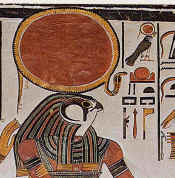
Table of Contents Return to course main page Return to library
WOMAN FOURTEEN
Asenath, Wife of Joseph
The heathen wife that God used
| I. Asenath was the daughter of Potipherah, priest of On. (Gen 41:45) A. Her father, Potipherah, was a priest at On. 1. On, a city in lower Egypt on the border of the land of Goshen, was a center of sun-worship. 2. Potipherah means “he whom the Ra gave.” (Ra was the sun-god.) 3. Not to be confused with Potipher, Pharaoh’s captain, which means “belonging to the sun.” B. Asenath means “belonging to the goddess Neith.” (For information on the goddess, click HERE and enter Neith in the Search for box.) C. Obviously Asenath came from a very religious family and was probably religious herself. Heathen, yes, but still religious. II. She married Joseph when he was thirty years old. (:46) |
 Sun god Ra |
III. She bore two children to Joseph. (:50)
A. She bore them within the first seven years of her marriage to Joseph. (:47-50)
B. The first child was named Manasseh and the second was Ephraim. (:51-52)
These, obviously, were the patriarchs of the tribes of Manasseh and Ephraim, two of the twelve
tribes of Israel.
IV. She faithfully followed her husband.
A. She faithfully bore him children. (:50)
B. She faithfully followed her husband when he went to bury his father. (Gen 50:7-8)
Summary- From the life of Asenath we can learn the lesson that God can use anyone. He can use the heathen just as He can use his own people. Also we see that the heathen can be blessed by being in the sphere of influence of God’s people. As God blesses his own, that blessing rubs off on those who are associated with His people.
Finally, we see that God is sovereign and no matter what happens and who God decides to use to have those things happens through, His will will be done. He used one of His own, Joseph, to nurture His people in time of dire distress; and He used a heathen, a religious heathen worshiper of idols at that, as the mother to bring forth two of the tribes of Israel.
Joseph married a heathen, Asenath, when he was in the heathen land of Egypt and there was no other choice. Also note, however, that when his family came and there were other choices available, he remained faithful to his heathen wife and did not put her away (divorce her). This parallel can be applied to the person who marries while lost and then gets saved. The NT admonishes the saved person to not put away their lost mate and try to find a Christian mate. If the lost mate wishes to dwell with the saved spouse then the saved one is to allow it to be so and to pray that the lost one will get saved later by seeing the Christian conversation (lifes) of the saved one. The lost one will (possibly and prayerfully) be encouraged to partake of the Salvation through Christ that they have had presented to them by the godly life of their saved mate.
I Cor 7:12-16 But to the rest speak I, not the Lord: If any brother hath a wife that believeth not, and she be pleased to dwell with him, let him not put her away. And the woman which hath an husband that believeth not, and if he be pleased to dwell with her, let her not leave him. For the unbelieving husband is sanctified by the wife, and the unbelieving wife is sanctified by the husband: else were your children unclean; but now are they holy. But if the unbelieving depart, let him depart. A brother or a sister is not under bondage in such [cases]: but God hath called us to peace. For what knowest thou, O wife, whether thou shalt save [thy] husband? or how knowest thou, O man, whether thou shalt save [thy] wife?
I Pet 3:1-2 Likewise, ye wives, [be] in subjection to your own husbands; that, if any obey not the word, they also may without the word be won by the conversation of the wives; While they behold your chaste conversation [coupled] with fear.
NOTE: You might take note, however, that if the unbelieving spouse CHOOSES to depart, the Christian mate left behind is then free to marry.
I Cor 7:15 But if the unbelieving depart, let him depart. A brother or a sister
is not under bondage in such [cases]: but God hath called us to peace.
I Cor 7:39 The wife is bound by the law as long as her husband liveth; but if her
husband be dead, she is at liberty to be married to whom she will; only in the Lord.
Compare those passages with a similar passage in Romans 7 (also by Paul.)
Ro 7:2 For the woman which hath an husband is bound by the law to [her]
husband so long as he liveth; but if the husband be dead, she is loosed from
the law of [her] husband.
When the language of Paul in I Corinthians is analyzed in context, then it is obvious that we are admonished to act as Joseph did toward Asenath and remain with our spouse even if they are unsaved. If, however, THEY decide to divorce us, then we are freed from our marriage bonds and we are free to marry again. However, remember that if we are freed from an unsaved spouse (only by their insistence upon divorcing us or if they commit adultery which allows us to divorce them) then we can only seek out a SAVED person to marry. We may have had the excuse that we were unsaved when we married our unsaved mate, but now we NO LONGER have that excuse because now we are saved and should KNOW BETTER than to marry an unsaved person. (II Cor 6:14-17, A marriage between a saved person and a lost person would HAVE TO be considered an unequal yoke!)
Instructions for LESSON FOURTEEN TEST.
If you fail this test then you must wait a minimum of one day before you can
retake it. During that time you are required to go to the textbook and the
Bible, whichever is appropriate, and find the correct answers to every
question missed on the failed test. You may use the copy of the
failed test that was sent to you and refer to it for the correct
answers, which are included on it, to verify that you have
found the correct answers in your study materials.
Once you have found all of the correct answers
and waited the required one day, then you
may retake the test.
LESSON FOURTEEN TEST
This test is "open
book," which means you may
use your study materials while taking this test.
You cannot proceed to the next Lesson until the day after you have
passed this Lesson Test and found all of the correct answers
in the textbook or the Bible, whichever is appropriate, to
all questions missed on this test even though
you received a passing score.
Once you have passed the Lesson Fourteen test, then
click the following link to return to the course
first lesson page. From there you can access
the Closed Book Test form which you must
submit to receive the Password for the
Final Test. Once you receive the
Password then you can proceed
to take your Final Test.
FINAL TEST